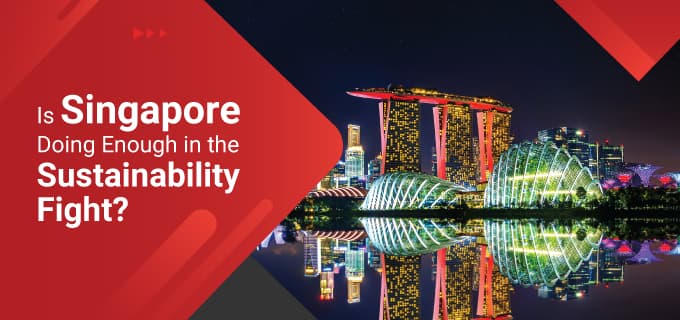In this article
Going green isn’t just a fad – it’s fast becoming a way of life.
And in order to help the earth, future generations, and the economy, we need to pay more attention to sustainability.
In this article, we discuss how Singapore, Southeast Asia’s promising green hub, is managing this pressing issue.
What Does Sustainability in Singapore Look Like?
There’s plenty of talk going around about how individuals, businesses, and countries need to adopt sustainable practices for a greener world.
Talk aside, how much is Singapore, a nation with lofty goals of being a global sustainable hub, actually doing, down to the consumer?
At the Consumer Level

Kantar’s Sustainability Sector Index 2022 in APAC reveals that although 97% of Singaporeans wish to live sustainably, there are factors that deter them:
- The rising cost of living (70% of respondents)
- Prioritising saving money over saving the planet (66% of respondents)
- Environmentally friendly products are pricier (72% of respondents)
- Distracted by their daily priorities (67% of respondents)
- Over half find it hard to determine ethically good or bad products (65%)
- The concern that environmentally friendly products work less well or are of lower quality (36% of respondents)
According to the study, only 30% of individuals having trouble with their household budgets actively find brands that help to alleviate the environmental impact.
On a positive note, it affirmed that the majority of consumers are more mindful of the causes that the brands they choose to support when making a purchase.
They are also likely to be aware of a business’ sustainability efforts and may support or cease the usage of brands depending on their environmental impacts.
A perception survey by SEC Newgate also confirmed significantly higher ESG awareness among consumers than its global average.
However, like Kantar’s study, respondents were more concerned over other financial and food priorities over environmental problems.
At the Business Level
According to the Business Times, 60% of Singapore SMEs feel that it is essential to implement sustainability practices in their companies.
Despite this, they also face struggles and problems with adoption. One common perception is that it is expensive to go green and that it is only relevant to big companies.
SMEs also believe that they have inadequate resources and knowledge.
Schneider Electric’s Singapore Green Pulse Survey also revealed that 76% of business leaders in the city-state are supportive of efforts to expand the green economy. Many companies are aware of green challenges and are ramping up efforts to tackle them.
At the Government and Country Level
Singapore has implemented sustainable measures early on, such as changing from fuel oil to natural gas to create electricity. Today, more than 95% of our electricity is generated using natural gas, helping to control the growth of our carbon emissions substantially.
In February 2021, the Singapore government started the Singapore Green Plan 2030, a 5-pillar nationwide movement to speed up its national agenda on sustainable development.
The plan also bolsters Singapore’s commitments under the United Nations’ 2030 Sustainable Development Agenda and Paris Agreement. It will enable itself to be better positioned towards achieving its net-zero emissions as soon as possible.
During the March 2022 progress update, the government announced several updates to drive sustainable growth for the community and businesses.
Some of the plan’s main goals are:
- To plant a million more trees
- For newly registered cars to use cleaner energy from 2030
- To ensure at least 20% of schools to be carbon neutral by 2030
- To boost solar energy deployment by 5 times
- To green 80% of buildings by 2030
- To position Singapore as a leading destination for green finance and services
Singapore also introduced the Enterprise Sustainability Programme to support local businesses in building sustainable capabilities and capturing new opportunities.
It offers training, support, and partnerships to accomplish its goal.
On a global scale, Singapore recently joined the Forests and Climate Leaders’ Partnership (FCLP) as a member country. It aims to work together with other member countries to decrease forest loss and support sustainable development.
Singapore’s government is certainly putting in plenty of effort gearing the country towards a more sustainable one. In fact, the Sustainable Trade Index ranks Singapore 5th globally in sustainable trade.
Can More Be Done?

Now that we’ve identified the sustainable activities and development at each level, can more be done to push Singapore forward collectively?
We discuss the possible ways forward:
Companies Need to Step Up
The good thing is, more people are more aware of the environmental issues we face, and are more conscious when they make their purchasing decisions.
However, problems persist – for example, 1 in 3 Singaporeans feel that sustainability isn’t part of their responsibilities, and should be a problem for companies to fix.
In reality, everyone has a part to play when it comes to achieving sustainability. Therefore, there is a need to educate consumers to change their mindsets.
There are also wary and skeptical consumers who have experienced greenwashing efforts, seeing misleading information about firms’ sustainable activities. They also feel that brands engage in sustainable practices for commercial purposes.
Brands must communicate clearly to consumers about their sustainable efforts, products, and services to influence and change their perspectives positively.
With the rising cost of living becoming a growing problem for many consumers, brands must also ensure that they have affordable prices to trigger purchase actions. They must do so to prevent sustainability from being a luxury to obtain economies of scale, drive adoption, and grow their business value.
With Singaporean consumers growing increasingly aware, there is also a need to tackle their key sustainable issues, including:
- Greenhouse gas emissions
- Dangerous waste disposal
- Air/water pollution
- Waste
- Overpackaging
- Overconsumption
The Way Ahead For Businesses
Clearly, the sustainable demand is growing. Stakeholders and investors are urging businesses to measure and implement sustainability and ESG.
Turning ESG into a priority means that it must be prioritised across the board, from leadership commitment to the areas of strategy and skills. Although sustainability may be linked to higher costs at the start, businesses must remember that the time benefits will outweigh these costs.
Businesses can take progressive steps by implementing environmentally friendly actions first. These can be minute – from reducing the amount of water to the energy used.
They can also integrate sustainability considerations in business decisions and set achievable targets for long-term success. In addition, they can adopt innovative sustainable solutions and put their money in green products and services.
Companies that successfully integrate sustainability into their businesses are better poised to attain long-term growth. In the long run, sustainable business practices make better economic sense as it shifts to become the new normal.
As carbon taxes and grid prices are expected to climb over the next few years, sustainable practices will help to alleviate these cost increases.
Businesses can make use of government initiatives, like the Green and Sustainability-Linked Loan Grant Scheme (GSLS), to access financing for investments in green projects. The scheme will also assist them in their shift towards more sustainable business models.
Singapore is Well-Positioned to Push Ahead With Sustainability
Regardless, it is certain that Singapore has paved a well-planned path ahead when it comes to forging a sustainable future. Companies in Singapore should seize opportunities in this upcoming sector to ensure continuous growth over the long run.
FAQs
Start your business in Singapore
Get expert ESG advice and implement green initiatives into your business!





